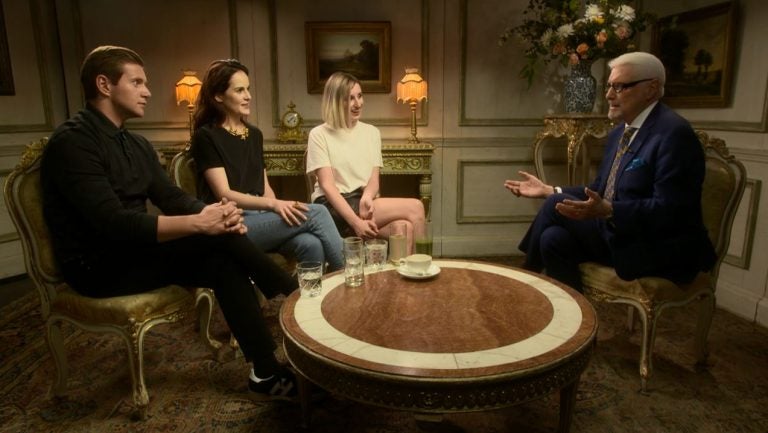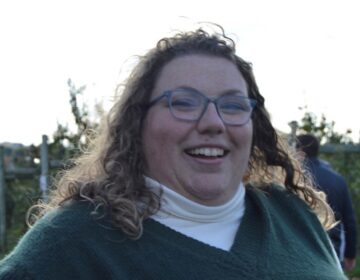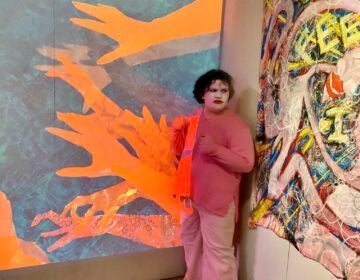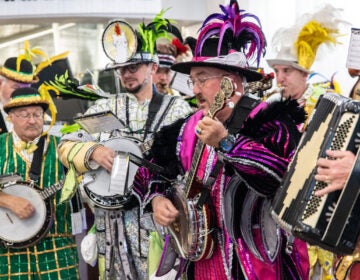Downton Abbey makes the transition from TV to feature-length film
Morning Edition host Jennifer Lynn speaks with WHYY film critic Patrick Stoner about how Downton Abbey made the jump from TV to full-length movie.
Listen 6:46
WHYY's Patrick Stoner speaking with cast members from 'Downton Abbey' L-R: Allen Leech, Michelle Dockery, and Laura Carmichael (WHYY)
Downton Abbey the movie opens today at a theater near you. It stars the original cast of the beloved public TV series.
The movie trailer teases to the aristocratic Crawley family, and their dutiful serving staff, entering a new era — when others have adjusted to life without maids, valets or other staff.
Popular characters: Robert, Cora, Lady Edith, Lady Mary, and others — they’re all there on the big screen.
Whether you’re familiar with these personalities, the drama they stir up and the rivalries they encounter, film critic Patrick Stoner says it doesn’t matter. The movie takes rabid fans and newbies into consideration. Morning Edition host Jennifer Lynn spoke to Stoner, the host of WHYY TV program “Flicks.”
Jennifer: So you saw the movie as it premiered in London.
Patrick: Yeah.
Jennifer: How does this historical period dramatic film reach out to the Downton devout and newcomers?
Patrick: Two words: Julian Fellowes. He’s the creator, and he was the genius behind all of this. He’s the reason that this is not just another costume drama. He took the first quarter of the film and just sort of introduced you to the area, what it was like during the time, then those characters began to interact in it. Not much is happening. In fact, you’re saying to yourself, “Is anything going to happen in this film?” But, of course, what he’s doing is, he’s getting the people who don’t know these characters to be very familiar with them in their environment and then that interlocking plot line begins and it happens very rapidly and ends up being a two-hour film.
Jennifer: In the trailer, it says it’s a new era for the Crawley family. What era is it?
Patrick: It’s 18 months after the last episode of Downton Abbey. And the king and queen are coming to visit Downton Abbey which is not just a big deal. It’s an Earth-shaking deal.
Jennifer: It’s huge. They have to do a luncheon, a parade, a dinner, for the king and the queen. Now under normal circumstances in that home, it goes crazy when they have to dine and entertain. I mean they go all out.
Patrick: Well, they also get taken over by all of the royal people who normally take charge of this, so Downton Abbey is not even in charge of itself which creates, of course, conflict.
Jennifer: Well you traveled to England to speak with members of the cast. At one point you sat with Michelle Dockery who plays Lady Mary and Laura Carmichael who plays her sister Lady Edith and Allen Leech, who plays Tom Branson, who was married to a third sister who passed long ago. Now you had a few moments with them. How wild was it to see them years after Downton ended its time on TV?
Patrick: I have to admit, the fan side of me was thrilled. I tried to suppress it and look professional but I don’t know, Jennifer, they might have been able to see through me.
Jennifer: I saw the raw tape of the interview you did.
Patrick: Oh yes, does it show?
Jennifer: Well, I was looking at them and they’re not in their royalty outfits. You know, they’re in jeans and a short little skirt.
Patrick: Well yeah, they’re actors.
Jennifer: I know, but like I never think of them as their actor people, their actor personas. They are these characters, aren’t they, all the time?
Patrick: Yes. Yes, Jennifer, all the time. Yes. Yes. It’s all real world. It’s a documentary.
Jennifer: Yeah. So you liked hanging with them. Patrick, you brought up in this interview the notion that doing a film is so different from a series: less time to establish the characters in the scenarios. That led you to a question: to what extent did these actors feel that they own these characters? And here’s Laura Carmichael who plays Lady Edith.
Laura Carmichael: We’ve gotten to know Julian so well and trust him so much with these characters we know so well that we are quite comfortable in these parts now I’d say. Coming back to do the film did feel very familiar.
Patrick: Oh yeah. Well here’s the thing. I don’t know if this is a little bit too esoteric to mention on the radio. But Julian Fellowes and I have the same favorite 19th-century author by the name of Anthony Trollope. Now if you’re not familiar with him, he wrote the Barsetshire Chronicles and The Pallisers. Here’s what we love about him: He had the ability to introduce you to characters that you feel you know really, really well. And then he would shift the emphasis. You’d get a different view of them, and you’d change your opinion of them. That’s exactly what he’s done with the Downton Abbey characters from the get-go.
Jennifer: Well Patrick, here’s Allen Leech who plays Tom Branson agreeing with you on this point.
Allen Leech: As you say he turns it. And it’s that thing that you go: I can’t believe he did that, but I’m so glad he did. I hate him for doing it. So you’re always kind of on the edge of your seat. Even in the movie, there’s those moments.
Jennifer: And another character: the Abbey itself. The set. Does the set hold up?
Patrick: This is a gorgeous film. If it’s gonna win any awards, it’s probably gonna be in the area of art direction, cinematography, and that you have the opportunity to do when you do a film, which you may not have the budget for, or the time to do, when you’re doing a series.
Jennifer: What’s glaringly the same and different?
Patrick: What’s the same is these are our old friends. You feel like they’re people that you loved who maybe went overseas for a couple of years, but now they’ve returned and you can’t believe it. You feel like they’ve never been gone, you’re still immediately bonded together and just being in their presence makes you happy. That’s certainly the same. What’s different is, this is Downton Abbey. There are beginnings and there are endings. Downton Abbey is a metaphor, for sort of eternity. That is to say, we are all made up of everything that has gone before and we are part of everything that is to come. But the image as a metaphor of Downton Abbey is: it’s there forever.
Jennifer: I love it.
WHYY is your source for fact-based, in-depth journalism and information. As a nonprofit organization, we rely on financial support from readers like you. Please give today.





